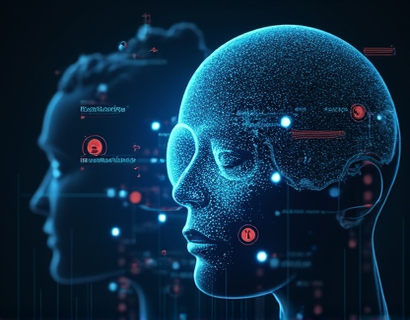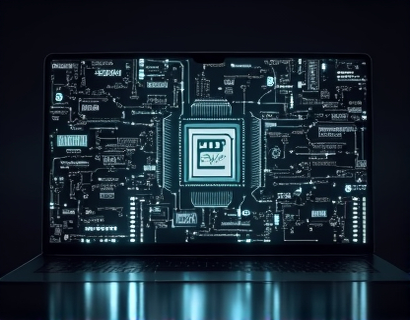AI and Crypto: Transforming Digital Engagement with Advanced Ecosystem Solutions
The intersection of artificial intelligence (AI) and cryptocurrency is ushering in a new era of digital engagement, where businesses can leverage advanced technologies to create more interactive, personalized, and secure user experiences. This transformation is not just about integrating two cutting-edge technologies; it's about redefining how digital ecosystems operate and how users interact with them. For tech professionals and enthusiasts, understanding this synergy is crucial for staying ahead in a rapidly evolving tech landscape.
Understanding AI in Digital Ecosystems
Artificial intelligence, with its ability to analyze vast amounts of data, learn from patterns, and make decisions, is a game-changer for digital ecosystems. In the context of cryptocurrency and blockchain technology, AI can enhance security, optimize transactions, and provide insights that drive user engagement. One of the primary ways AI is integrated is through smart contracts, which are self-executing contracts with the terms directly written into code. AI can optimize the execution of these contracts, ensuring they are executed efficiently and securely, reducing the need for intermediaries and lowering transaction costs.
Moreover, AI-driven analytics can process the massive datasets generated by blockchain transactions, providing businesses with valuable insights into user behavior, market trends, and potential risks. This data can be used to tailor services and products, creating more personalized experiences that keep users engaged and loyal. For instance, AI algorithms can predict user preferences and behaviors, enabling businesses to offer customized recommendations and services that resonate more deeply with their audience.
Cryptocurrency and User Engagement
Cryptocurrency, with its decentralized and transparent nature, offers unique opportunities for enhancing user engagement. The use of tokens and cryptocurrencies within digital ecosystems can incentivize user participation and reward desired behaviors. For example, a platform might issue a native token that users earn by contributing content, participating in discussions, or completing specific tasks. These tokens can then be used to access premium features, vote on platform decisions, or even traded for other cryptocurrencies or fiat currency.
The introduction of cryptocurrency also addresses some of the traditional pain points in digital engagement, such as data privacy and user control. By using blockchain technology, users have greater control over their data, as it is stored in a decentralized manner and can be managed through private keys. This not only enhances security but also builds trust, a critical factor in user engagement. When users feel secure and in control, they are more likely to engage deeply with a platform.
AI-Driven Personalization in Crypto Ecosystems
One of the most significant benefits of combining AI and cryptocurrency is the ability to deliver highly personalized experiences. AI algorithms can analyze user data to understand individual preferences, behaviors, and needs, allowing for tailored interactions within the digital ecosystem. For instance, a crypto exchange could use AI to analyze a user's trading history and risk tolerance to recommend suitable investment strategies or alert them to potential market opportunities.
Personalization extends beyond just recommendations. AI can also optimize the user interface and experience based on user interactions. For example, frequently used features can be made more accessible, while less used ones can be streamlined or hidden. This not only improves usability but also enhances the overall user experience, keeping users engaged for longer periods.
Enhancing Security with AI and Crypto
Security is a paramount concern in the digital ecosystem, especially with the increasing sophistication of cyber threats. The combination of AI and cryptocurrency offers robust solutions to enhance security measures. AI can be used to detect and prevent fraudulent activities by analyzing patterns and identifying anomalies in real-time. For instance, machine learning algorithms can monitor transaction patterns and flag suspicious activities, such as unusual login times or locations, before they result in a breach.
Blockchain technology itself provides a high level of security through its immutable and transparent ledger. However, AI can further strengthen this by enhancing the smart contracts that govern transactions. AI can audit smart contracts for vulnerabilities, ensuring they are free from bugs and exploits. Additionally, AI can automate the updating of smart contracts to adapt to new security threats, maintaining a robust defense mechanism.
Fostering Community and Decentralization
The decentralized nature of cryptocurrency aligns perfectly with the principles of community-driven ecosystems. AI can play a crucial role in fostering these communities by facilitating communication, collaboration, and governance. For example, AI-powered chatbots can handle customer support, providing instant responses and helping users navigate the platform. These chatbots can also gather user feedback, which can be analyzed to improve the ecosystem continuously.
Decentralized autonomous organizations (DAOs) are another area where AI and cryptocurrency intersect. DAOs use blockchain to manage decision-making processes, allowing community members to vote on proposals and governance issues. AI can enhance this by analyzing voting patterns, predicting outcomes, and providing insights that help the community make more informed decisions. This not only increases transparency but also empowers users, making them active participants in the ecosystem's development.
Innovative Business Models
The integration of AI and cryptocurrency is giving rise to innovative business models that redefine how value is created and distributed. One such model is the tokenized economy, where tokens represent assets, services, or utility within the ecosystem. AI can optimize the issuance, distribution, and trading of these tokens, ensuring fairness and efficiency. For instance, AI can dynamically adjust token supply based on market demand, preventing inflation or deflation and maintaining the token's value.
Another innovative approach is the use of AI-driven predictive analytics to create new revenue streams. By analyzing market trends and user behavior, businesses can anticipate demand and offer premium services or products before they become popular. This proactive strategy not only enhances user engagement but also generates additional revenue. For example, a crypto-based gaming platform could use AI to predict which in-game items will be in high demand and offer them as exclusive tokens, creating a new monetization channel.
Challenges and Considerations
While the potential benefits are significant, integrating AI and cryptocurrency in digital ecosystems also comes with challenges. One of the primary concerns is regulatory compliance. The crypto space is still largely unregulated, and the use of AI adds another layer of complexity. Businesses must navigate varying regulations across jurisdictions to ensure compliance and avoid legal issues. This requires a deep understanding of both AI and crypto regulations, as well as proactive engagement with regulatory bodies.
Another challenge is the technical complexity involved in integrating these technologies. Developing AI algorithms that can effectively process and analyze blockchain data requires specialized skills and resources. Moreover, ensuring the interoperability of AI systems with existing blockchain infrastructure is crucial for seamless integration. Collaboration between tech experts, blockchain developers, and AI specialists is essential to overcome these technical hurdles.
Future Prospects
The future of AI and cryptocurrency in digital ecosystems is promising, with numerous opportunities for growth and innovation. As AI technology continues to advance, we can expect more sophisticated applications that further enhance user engagement and security. For instance, the development of more advanced natural language processing (NLP) capabilities could lead to more intuitive and human-like interactions with AI-powered assistants within crypto ecosystems.
Additionally, the rise of Web3, which builds on blockchain technology to create a decentralized internet, presents a fertile ground for AI and cryptocurrency integration. Web3 applications will leverage AI to provide seamless, secure, and personalized experiences, redefining how users interact with the digital world. The convergence of these technologies will not only transform individual platforms but also reshape the entire digital landscape, creating more resilient, user-centric, and innovative ecosystems.
For businesses looking to capitalize on this trend, investing in AI and cryptocurrency research and development is crucial. By staying at the forefront of these technologies, companies can gain a competitive edge, drive growth, and lead the charge in digital innovation. The key is to approach this integration thoughtfully, addressing both the opportunities and challenges to create truly transformative digital experiences.











































